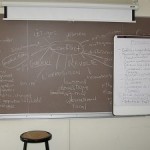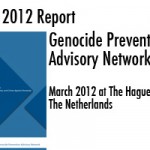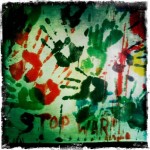On February 1, AC4 Executive Co-Chair Dr. Peter T. Coleman and project coordinator Kristen Rucki traveled to Bilbao, Basque Country. There they initiated the ground-truthing and stakeholder engagement phase of AC4’s Sustainable Peace Mapping Initiative, and Dr. Coleman also gave a public presentation on the topic of sustainable peace. In a half-day workshop co-sponsored by… read more
By Raelene Hodgson, CRUW youth worker As the leaves changed colour and crispness appeared in the air, this October marked the completion of the inaugural year of the Culturally Relevant Urban Wellness program (CRUW). Over the past seven months, 26 youth spent every second Saturday learning, playing and getting their hands dirty at the UBC… read more
Aboriginal peoples across North America share a common history of colonization and assimilation that spans many generations, and reclaiming cultural and political autonomy in the face of lingering prejudice is a complex and ongoing process. Within Canada, “Aboriginal” is a legal designation that includes First Nations, Inuit and Métis (those of shared First Nations and… read more
The Missing Piece in Sustainable Peace Peter T. Coleman November 4, 2012 Despite Governor Romney’s newfound call for international peace during the final presidential debate, as well as all of the other political rhetoric bandied about on peace, the fact is we know very little about what it is (and what it isn’t), the conditions… read more
By David Overall, CRUW Research Coordinator Vancouver Aboriginal Child and Family Services Society (VACFSS) In the City of Vancouver, British Columbia Canada’s Aboriginal peoples comprise the nation’s youngest and fastest growing population. In Canada, the term “Aboriginal” denotes First Nations, Inuit, and Métis peoples in Canada. Between 1996 and 2006, the Aboriginal population of Canada… read more
By Josefine Roos, AC4 Fellow. Since taking office in March 2011, President Thein Sein of Myanmar has taken important steps to improve the prospects for peace between the government (dominated by Myanmar’s ethnic majority, the Bamah) and the country’s ethnic minorities. A staggering twelve ceasefires have been signed with ethnic armed groups in the last year alone…. read more

This blog was originally posted to the State of the Planet blog by Alex Fischer of the Center for International Earth Science Information Network (CIESIN). On the eve of a new academic year with students returning to campus to begin new courses and degree programs, there is a renewed effort to identify the need for… read more
by Andrew Zemlan In the keynote address to the Symposium on Genocide Prevention on July 24th at the United States Holocaust Memorial Museum, Secretary of State Hillary Clinton elaborated on the new Atrocities Prevention Board (APB) and discussed mechanisms the APB will use to prevent mass atrocities. Such a speech from a top senior official,… read more

by Tetsushi Ogata The Advanced Workshop of the Genocide Prevention Advisory Network (GPANet) was held on March 14-15, 2012 in The Hague, in collaboration with the Ministry of Foreign Affairs of the Netherlands, with support from the Federal Department of Foreign Affairs of Switzerland. GPANet convened its members and international experts for the two-day sessions… read more

by Stephen Gray In an earlier blog post about our research exploring latent capacities for peace in Burma/Myanmar, I alluded to the divergent views of what “peace” means to the different parties to the conflicts that have long plagued this country. From what we have learned so far, different groups in Burma rarely respect or… read more





